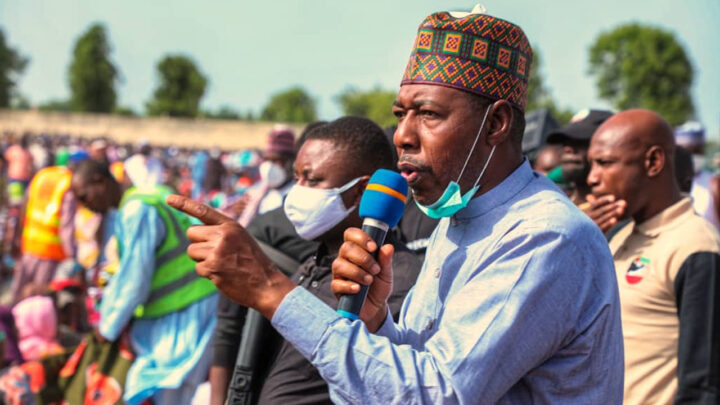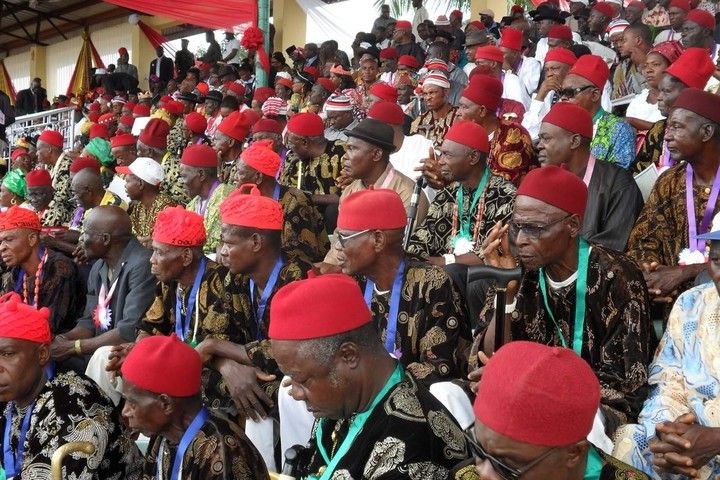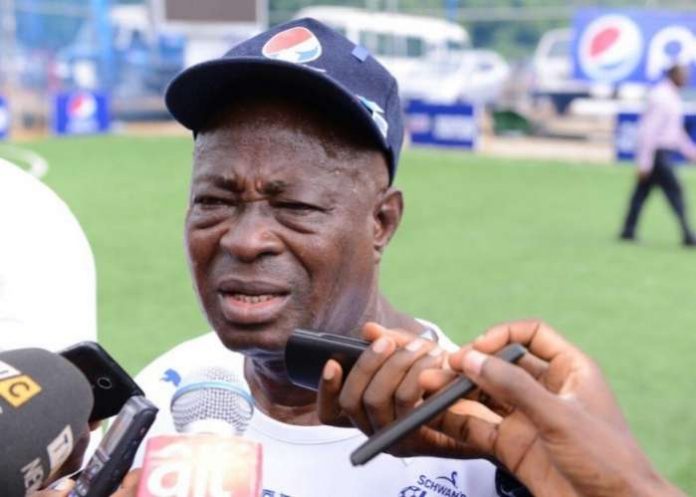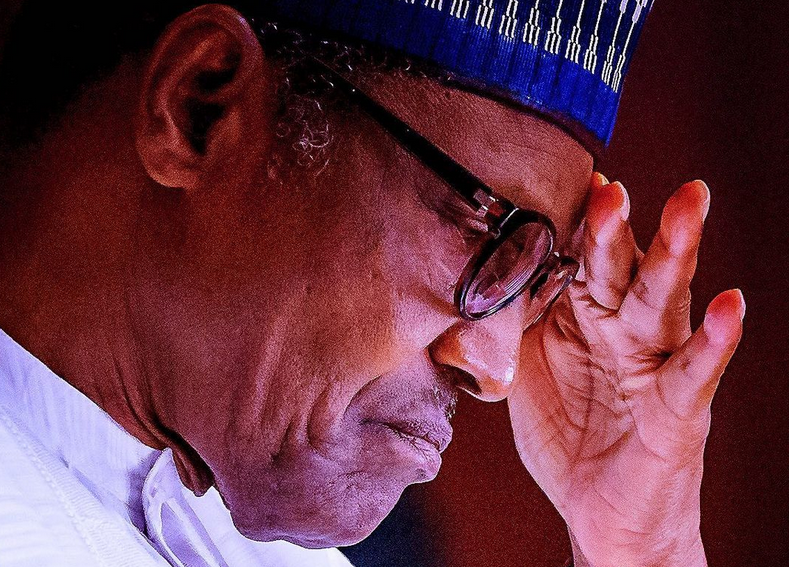Last week, at a lecture, to commemorate my 50th birthday and the public presentation of my book titled: ‘Strategic Turnaround: the story of a government agency’, the Borno State Governor, Prof. Babagana Zulum raised the bar of discourse on a number of national issues. As would be expected the news media made a feast of the position of the cerebral but frank professor turned Governor . Speaking on the topic: “Security and Economic Growth: Leadership in Challenging Times,” the Borno governor aligned himself with the calls by a growing list of political elite insisting that power should shift to the south at the end of Buhari presidency. In his words ;”Power rotation is a covenant between us, hence, the need to shift the power to South.”
The governor’s statement aligns with prominent northerners’ recent views, such as Katsina State Governor Bello Masari, Kaduna’s Gov. Nasir El Rufai, his Kano counterpart, Abdullahi Ganduje, and former Military Head of State Gen. Yakubu Gowon. They have stated that for national unity and greater cohesion in an imperfect federal system , the highest office in the land should be zoned to the Southern part of the country come 2023.
The concept of power shift has been a dominant factor in Nigerian politics. The various regions and ethnic groups that make up the country engage in a perennial struggle for power at the federal level. It is all about presidential power as constituent parts want the presidency, which confers enormous powers and perceived benefits.
Historically, it had gained greater prominence after the annulment of June 12, 1993, Presidential Election in Nigeria when a Southerner, Chief M.K.O. Abiola, won the election. The election was annulled by the then Military President, General Ibrahim Babangida, who incidentally comes from the Northern part of Nigeria . The agitation against the annulment of the election led to Nigeria’s novel situation when the two major political parties in the 1999 general elections fielded Olusegun Obasanjo and Olu Falae. Both came from the Yoruba ethnic stock in southern Nigeria, the same ethnic group with MKO Abiola, presumed winner of the election.
Advertisement
Since then, political discourse has been about people asking for power shift either to one part or the other under the guise of equity and justice. For 2023, the current soundbites are that while some Southern politicians claim that it is their turn to produce the president, some northern elements insist that it should be thrown open for all to compete.
The power shift concept gained traction in Nigeria as some southerners accuse the North of perpetual dominance and federal power control. It is undeniable that the perceived fear of domination by the North is one of the factors behind the growing enterprise of ethnic agitation threatening the corporate existence of Nigeria. In most cases, the rest of the ethnic groups in Nigeria that failed to find themselves in the mainstream of power at the centre, especially at the presidency, resort to unpatriotic acts and pursue their region or ethnic group’s interest to the detriment of our national aspirations.
It is a fact that some secession agitators in the South exploit these fears and some perceived marginalisation by the North for political and personal gains. Therefore, we hope that a power shift in a multi ethnic society with evolving democratic culture, as suggested by Governor Zulum, will douse these tensions, and give people a sense of belonging and fairness .
Advertisement
However, the power shift will not have been necessary for Nigeria if we practise true federalism. The country is supposed to run a federal government system whereby the federating units exert meaningful control over their territories and resources, which would make or mar the destiny of their states.
However, we have centralised federalism with a quasi-imperial president who virtually wields the power of life and death over all Nigerians. The reality and enormity of this presidential power makes every part of the country want to produce the president.
Ideally, power shift should be an anathema in politics. No one disputes that it breeds mediocrity as the best candidates for president may be shut out of that office because of where they originate. It undoubtedly impedes good governance, national integration, and democracy. It is most likely that the same leaders to emerge by the power shift are still those who have been participating in the Nigeria enterprise right from independence and are responsible for most of the country’s political problems today.
However, Nigeria’s extant political realities have made it reasonable to consider the unity and cohesion that power shift entails, but Zulum argued that competence must not be compromised. In his words, competence and character should be given greater consideration over loyalty.
Advertisement
Reacting to some who may argue that competence should trump the need for stability and peace a power shift may bring, I have a few pertinent questions. Of what need is having the most competent leader when he is bogged down by persistent and secessionist agitations from sections of the country who feel denied of the proverbial ‘national cake’? Would it not probably take superhuman qualities for the ‘competent’ leader to achieve sustainable development in the absence of national unity, security, and peace, when some of the country’s constituent units openly display their discontent with the Nigerian project.
So, as we recognise the need for power shift, we should also look at what must be done to ensure that democratic culture is deepened and governance is enhanced.
One constant thing in Nigeria is that we seem to clutch tenaciously to a concept that is peddled as a panacea to our problems at each point of our national life. There was a time most Nigerians believe that the country would be a better place if power moves from the North to the South. Then the Obasanjo presidency happened, and the fundamental national problems remained.
Governor Zulum, during his presentation, made a further illuminating contribution to the issues facing Nigeria. On the survival of Nigeria, the governor opined that security, unity, and peace are needed whether Nigeria is splitting or staying together. He further argued that most times, we appraise the country’s security situation by the actions or inactions of the federal government and specifically the presidency. This does not seem right in his estimation.
Some of the country’s security challenges result from ineffective leadership from incompetent state governors and other local leaders. For example, why would a state with the same circumstances and location have more herdsmen clashes and other security challenges than the others? Possibly, it might be because some state chief executives are primarily interested in their selfish interests and have no creative strategies to improve the security situation in their states. Some are even part of the problem. Some wine and dine with hoodlums and known security threats, whilst others allegedly go as far as instigating or facilitating ethnic and communal tension in their domain to whip up public sentiments to gain popular support and electoral advantage.
Advertisement
Even if we shift power to the South in 2023, whoever happens to ascend to the president’s office would likely face the challenge of tackling farmer-herder clashes and the Boko Haram insurgency, kidnappings, armed robbery, and other security challenges. So, our security challenges need an immediate and all-inclusive effort to make Nigerians feel more secured to facilitate economic development and prosperity.
Secondly, the governor made the point that Nigeria’s problem remains a leadership problem. There have been insinuations here and there that Nigerians are challenging people to govern. This notion strives to move our problem away from political leaders to the masses who are portrayed as evil followers.
The above is not valid. Nigeria’s problem rests mainly with our leaders and political class. From all governance levels, we lack visionary and transformational leaders whose impact would go beyond politics to all facets of our national life – economy, culture and even religion. China had Mao Zedong. Singapore had Lee Kuan Yew. Malaysia had Mahathir Mohamad.
Advertisement
Paul Kagame is becoming a legend in Rwanda. There is no evidence that these countries had or have better followers than Nigeria has today.
Addressing the issue of restructuring, Zulum argued that although most Nigerians recognise the need for some form of restructuring, the bitter truth is that specific fundamental changes are necessary. Without a change in our value system, political ethos and exemplary leadership, no meaningful progress would be made even if each Nigerian state becomes a country of its own. The unconscionable looting of public funds, maladministration, corruption, and impunity that seem to have been embedded in the Nigerian political class psyche would ultimately prevail to truncate whatever political concept we adopt in Nigeria.
Restructuring has become today’s political elixir. Some groups are portraying powershift as the antidote to the persistent Nigerian political problem. However, whatever system we choose to adopt, whatever strategy we ultimately decide to explore, if we do not change our attitude and approach to leadership and governance in Nigeria, we would only dance around a vicious circle.
Advertisement
Views expressed by contributors are strictly personal and not of TheCable.
Add a comment







